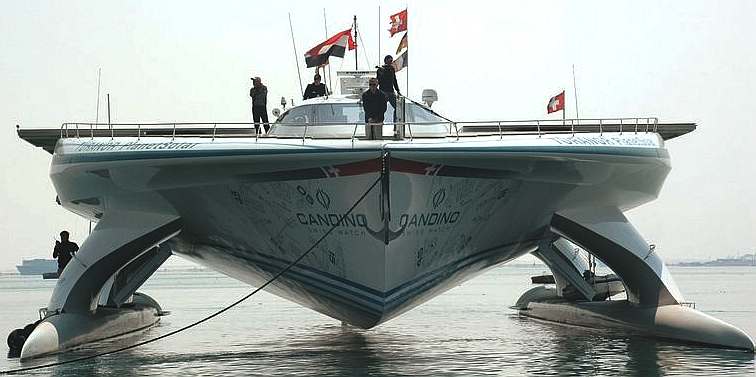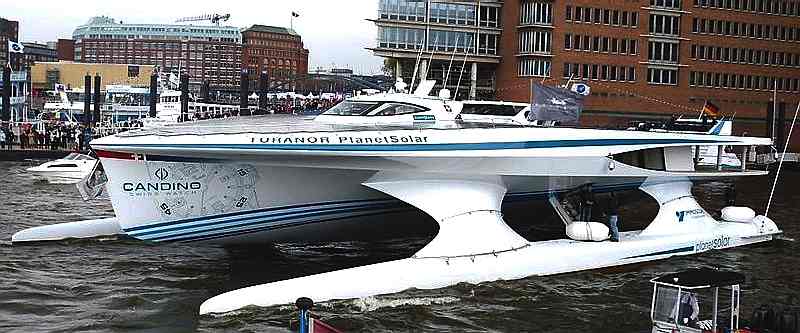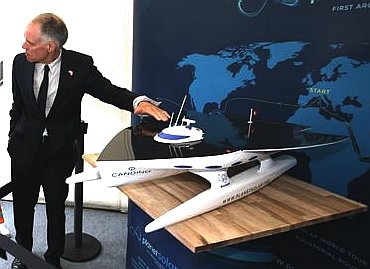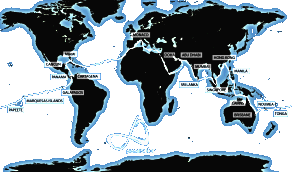|
Tūranor PlanetSolar, also known under the project name PlanetSolar, is an entirely solar powered boat that was launched on 31 March 2010. It was built by Knierim Yachtbau in Kiel,
Germany, and was designed by LOMOcean Design, formerly known as Craig Loomes Design Group Ltd.. It is the largest solar-powered boat in the
world.

March
2012 the PlanetSolar in the Suez Canal
Similarly to Earthrace, another boat designed by LOMOcean Design, Tūranor PlanetSolar is planning to set a round-the-world record that will promote the use of sustainable
energy. Instead of using Bio Diesel like Earthrace, Tūranor PlanetSolar plans to exclusively use solar power. In doing so, Tūranor PlanetSolar will become the first ever boat to circumnavigate the world using solar power
alone. In order to fulfill this challenge, the boat is covered in over 500 square meters of solar panels rated 93 kW,
which in turn connect to one of the two electric motors in each hull. Although its hull is capable of hosting 200
persons, the shape of the boat means that it will be able to reach speeds of up to fourteen
knots. The boat's hull has been model tested in wind tunnels and has been tank tested to determine the hydrodynamics and aerodynamics of the hull. This 31 meter long boat has been designed to be used as a luxury yacht after the record attempt is
finished.
On 27 September 2010 Tūranor PlanetSolar started on a journey around the world in Monaco. With this expedition, the iniatiors of the project would like to focus the public awareness on the importance of renewable energies for environmental protection. The crew of six will circumnavigate the globe solely with the aid of solar power. Captain of the expedition is Frenchman Patrick Marchesseau. Other participants are Christian Ochsenbein (Bern, Switzerland) and Jens Langwasser (Kiel, Germany); as well as project initiator Raphael Domjan (Yverdon-les Bain, Switzerland). On the first leg across the Atlantic Ocean technician Daniel Stahl (Kiel, Germany) and first mate Mikaela von Koskull (Finland) were part of the crew. On 27 November 2010 the solar boat reached Miami. A significant stopover was Cancśn, during the United Nations World Climate Conference.
At the centerline of the world tour, the French Canadian Captain Erwann Le Rouzic took over in New Caledonia mid may 2011, for the further circumnavigation sharing the master's responsibility with Captain Patrick Marchesseau.
End of May 2011, the world's largest solar boat docked at Brisbane, where in an official ceremony the "PlanetSolar Relay for Hope" was launched, a global relay children and young people can take part in and present their visions and hopes for a solar energy driven world through essays, videos, music, drawing and models.
On the first solar boat expedition around the globe, the TŪRANOR PlanetSolar has already reached two records: fastest crossing of the Atlantic Ocean by solar boat and longest distance ever covered by a solar electric vehicle.
The current routing around the globe (subject to favourable weather and nautical conditions) foresees stopovers in several port cities to inform the public about the importance of sustainable and renewable energies.
The boat is registered in Switzerland and was financed by a German entrepreneur. Construction cost was 12.5
million. The name Tūranor, derived from J.R.R. Tolkien's novel The Lord of the Rings, translates to "The Power of the
Sun".

LINKS:
-
Technical
Data Sheet". PlanetSolar. http://www.das-solarboot.de/technical-data-sheet.html.
-
"Tūranor
PlanetSolar". Knierim Yachtbau. http://www.knierim-yachtbau.de/html/gb/yachts/planet-solar.php.
-
"The
solar boat PlanetSolar is launched during ceremony in Kiel".
Reuters.
http://www.fotoglif.com/f/eid4m89dm74f.
-
Pilato,
Fabrizio (February 26, 2010). "PlanetSolar
set to sail in March". Mobile Magazine.
http://www.mobilemag.com/2010/02/26/38000-photovaltaic-solar-cells-set-to-sail-in-march/.
-
Gaylord,
Chris (February 26, 2010). "PlanetSolar:
The sun-powered super yacht". The Christian Science
Monitor. http://www.csmonitor.com/Innovation/Horizons/2010/0226/PlanetSolar-The-sun-powered-super-yacht.
-
"First
around the World with solar Energy". PlanetSolar.
http://www.planetsolar.org/bateau.en.php.
-
"PlanetSolar
Unveils World's Largest Solar Boat". Environment News
Service. February 27, 2010. http://www.ens-newswire.com/ens/feb2010/2010-02-27-02.html.
-
Kharrl,
Nate (April 13, 2009). "Solar
Planet Plans to Circle the Earth on Solar Power". Eco
Factory. http://www.ecofactory.com/news/solar-planet-begins-construction-sun-powered-boat.
-
"PlanetSolar".
LOMOcean Design. http://lomocean.com/project.php?id=7.
Retrieved 2010-04-24.
-
Behling,
Frank (24 April 2010). "Das
Solarschiff fährt" (in German). Kieler Nachrichten.
http://www.kn-online.de/lokales/kiel/148722-Das-Solarschiff-faehrt.html.
-
"A
Milestone in the Progress of Solar Mobility". PlanetSolar.
http://www.das-solarboot.de/index.html.
-
planetsolar.org
-
lomocean.com
THE
ROUTE:
The
first solar electric world circumnavigation was from the East to the
West. The Tūranor Planet Solar departed on 27 September 2010 from
Monaco. The team followed a route close to the Equator as per the Solar
Navigator's planned route. After crossing the Atlantic
ocean, the Panama Canal, the Pacific
ocean, the Indian ocean, the Suez Canal,
and the Mediterranean, the ship will reach Monte Carlo with an estimated
time of arrival set to spring 2012.

Final
PlanetSolar model design
- solar powered catamaran
THE
BOATS SPECIFICATIONS:
| Switzerland |
 |
| Name: |
Tūranor PlanetSolar |
| Owner: |
PlanetSolar SA |
| Builder: |
Knierim Yachtbau, Kiel, Germany |
| Cost: |
12.5 million |
| Launched: |
31 March 2010 |
| General
characteristics |
| Class and type: |
Yacht |
| Displacement: |
85 metric tons |
| Length: |
31 m (35 m with flaps) |
| Beam: |
15 m (23m with flaps) |
| Propulsion: |
2 Permanent Magnet Synchronous
Electrical Motors - 60kW each (max) @ 1600 rpm
2 Permanent Magnet Synchronous Electrical Motors - 10kW each
(max) @ 1000 rpm |
| Speed: |
max.: 14 knots (26 km/h)
cruising (est.): 7.5 knots (14 km/h) |
| Crew: |
4 |
PlanetSolar
is currently the biggest solar ship in the world (at 17-4-12). 537 m2 of
photovoltaic panel power 6 blocks of lithium-ion batteries. This
technology offers maximum power and energy density, thus enabling a
navigation time that is unmatched to date!

World
route map
PlanetSolar
Case Postale 70
CH-2009 Neuchātel
Postal
Account: 17-450479-6
By
E-mail : info@planetsolar.org
Partners: partenaires@planetsolar.org
Press: press@planetsolar.org
Design
concept Raphael
Domjan - PROMOTIONAL
TOUR 2012
English
- Swiss
- French
- History
- Links
- Homecoming



Other
European Solar Boats -

The
Solar Navigator - 2nd test model 1996-1997
The
latest Solarnavigator is designed to be capable
of
an autonomous
world navigation set for an attempt
in
2015 is all goes according to schedule.
A
taste for adventure

John
Storm tackles pirate whalers
|




